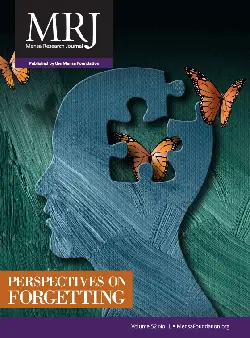
I know there are plenty of articles on memory in mainstream media as well as considerable research in academic journals on the topic. But what about memory’s counterpart? What about forgetting? Curious, I began a search for research articles on the topic. My curiosity was rewarded with a wealth of information that presented many perspectives on forgetting as well as the useful purposes it can serve.
Our first article, “The Many Faces of Forgetting: Toward a Constructive View of Forgetting in Everyday Life,” draws from cognitive, neuroscientific, and applied research to suggest three roles that forgetting supports: as a Guardian, Librarian, and Inventor. It argues that these roles help us understand “how forgetting provides memory with many of its cardinal virtues”: serenity, stability, clarity, revision, abstraction, inspiration, and rediscovery. The Guardian role is protective; the Librarian role helps us manage and improve efficiency; and the Inventor role encourages exploration and creativity.
The second article, “The Adaptive Value of Forgetting: A Direction for Future Research,” appeared in the same journal and provides some interesting commentary on the first article. The authors also propose some specific areas for further research.
“Varieties of Graded Forgetting” proposes different levels of forgetting, with varying types, contexts, processes, impact, and usefulness, among other factors. Forgetting and memory are intertwined, so what affects memory also has an impact on forgetting, particularly on an emotional level.
“The advantage of a bad memory is that one enjoys several times the same good things for the first time.”Friedrich Nietzsche
An opinion piece, “Memory Control: A Fundamental Mechanism of Emotion Regulation,” explores the role that memories play in our emotional lives. I was interested in whether memories that bring up uncomfortable emotions are more likely to be suppressed or forgotten than those with pleasant emotions. While I didn’t find a conclusive answer to that, the article did provide me with a better understanding of the dance between memory and emotions, albeit raising even more questions for future research.
“Forgetting and Emotion Regulation in Mental Health, Anxiety and Depression” echoes ideas from the earlier articles and concludes that “[f]orgetting is not necessarily counterproductive and disadvantageous” but instead can help with emotion regulation and even be associated with mental health — an aspect that seems logical yet one I had not previously considered.
Finally, “The Biology of Forgetting — A Perspective” lends some insights into the brain’s memory management system. Not only does our brain have mechanisms for remembering but also ones for forgetting. On that note, I leave you to explore further these perspectives I’ve found on forgetting.
I am saddened to report the death of Dr. James R. Flynn, whose work was the theme of the Fall 2020 issue of the Mensa Research Journal. He died on Dec. 11, 2020, in Dunedin, New Zealand, at the age of 86. An Emeritus Professor at the University of Otago in New Zealand, he was described by his colleagues as “a legendary teacher,” “a giant amongst scholars,” and “an intellectual titan” who will be greatly missed.
In closing, I want to say thank you to Dr. Francis Cartier for his many years of service to the MRJ as a member of the Editorial Advisory Board and author of the “Notes, Quotes & Anecdotes” column. At the age of 97, he has decided to retire from these volunteer roles. His insight and curiosity have added a spark to each issue.
* * *
Published three times yearly, the Mensa Research Journal highlights scholarly articles and recent research related to intelligence from a diverse selection of nationally and internationally esteemed authors. Learn more about the MRJ and subscribe today.
Featured Research
- “The Many Faces of Forgetting: Toward a Constructive View of Forgetting in Everyday Life”, by Jonathan M. Fawcet and Justin C. Hulbert (Journal of Applied Research in Memory and Cognition, Vol. 9, Issue 1)
- “The Adaptive Value of Forgetting: A Direction for Future Research”, by Jeffrey D. Karpicke and Michelle E. Coverdale (Journal of Applied Research in Memory and Cognition, Vol. 9, Issue 1)
- “Varieties of Graded Forgetting”, by Simon Nørby (Consciousness and Cognition, Vol. 84)
- “Memory Control: A Fundamental Mechanism of Emotion Regulation”, by Haakon G. Engen and Michael C. Anderson (Trends in Cognitive Sciences, Vol. 22, Issue 11)
- “Forgetting and Emotion Regulation in Mental Health, Anxiety and Depression”, by Simon Nørby (Memory, Vol. 26, Issue 3)
- “The Biology of Forgetting — A Perspective”, by Ronald L. Davis and Yi Zhong (Neuron, Vol. 95, Issue 3)










Comments (0)